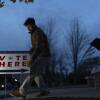With a nod to Shakespeare, a chokehold by any other name is still a deadly police tactic. I don’t care what you call it as long as real police reform is the tangible outcome of the last two weeks or more of worldwide protests in the wake of George Floyd’s killing. In a relatively short period of time, I’ve watched as activists have pivoted from cries of "no justice, no peace" to calls for getting rid of police tactics like the fatal chokehold. Much of the public debate seems to be focused on two arguments — defund local police units by reallocating funds to other community-based services or dismantle entire city police departments and build from scratch. This is actually much more than a matter of semantics. It’s really about a fundamental shift in how we will view the role of police in our society.
Deciding on that role will be a lot more complicated than an either-or proposition. But it’s worth noting the large and small changes already in the pipeline. At George Floyd’s funeral in Houston, Mayor Sylvester Turner, who is African American, announced an executive order banning police chokeholds and strangleholds. Turner said because Floyd died, “the rest of us will now be able to breathe.”
Before Floyd was laid to rest, Minneapolis city authorities joined with their state counterparts creating an agreement that also eliminates chokeholds and neck restraints. Additionally, it allows the public more access to the record of officers who’ve been disciplined.
The agreement, which is subject to a judge’s approval, also includes what I believe to be a critical change to Minneapolis’ police policy, one I’d like to see made part of every police contract. It requires that officers intervene and immediately report fellow officers using excessive force. If they don’t, they will be “subject to discipline to the same severity as if they themselves engage in the prohibited use of force.” Minneapolis Police Chief Medaria Arradondo, who is African American and supports this policy change, emphasizes that “it doesn’t matter if you are two days on the job or 20 years on the job.“
Finally, a mandate which targets the blue code of silence. The code which has often pressured good cops to cover for the proverbial bad apples. Chicago cops like the ones who watched fellow officer Jason Van Dyke pump 16 shots in the back of 17-year-old Laquan McDonald. Not only did they not intervene, but they also kept silent when Van Dyke wrote up a false report saying the black teen was coming at him with a weapon. Once again, a video revealed the truth. Van Dyke is one of the few police officers to be held accountable, now serving out a six-and-a-half year sentence for second-degree murder. That’s the same charge Derek Chauvin faces for keeping his knee on George Floyd’s neck for eight minutes and 46 seconds while he was face down on the ground and handcuffed. The other three officers — Thomas Lane, J. Alexander Kueng and Tou Thao — are now charged with both aiding and abetting second-degree murder and manslaughter for their failure to intervene. All three seemingly unmoved by the pleas of the witnesses on the street begging them to help Floyd. Silence equals death.
The thousands of protestors who have taken to the street shouting George Floyd’s name have channeled their rage and frustration into a worldwide megaphone for police reform. They’re impatient for local communities to concretize policies that will constitute structural changes in police accountability. However, those changes are ultimately defined, it’s about time.





